In Search of Lost Time Quotes By Proust That I Found Too Hard to Ignore – Collected from Volume One
Previously, I published the ethereal lines from Proust’s Swann’s Way (In Search of Lost Time Vol 1) underlining his understanding of human composition and admirable usage of precise words. Now I bring you quotes by Proust collected from the length of the same volume Swann’s Way (Book 1 of the 6-Volume collection In Search of Lost Time).
The below Marcel Proust quotes tell us our griefs aren’t unique, that we aren’t the only ones miserable and despondent in love, that our minds and memories play tricks on us all, and that habits anchor us to the known. These collected words also emphasize the everlasting joy that nature brings, prove we all lie to ourselves, highlight the illusion of power, and tenderly sympathize with us for bearing the mundaneness of acceptance.
Hope you enjoy these words pulled from the depths of Proust’s consciousness.
42 Quotes From Proust to Help Us Think Straight and See Clearly
#1
“Habit! Adept but unhurried planner, who, in a temporary residence, at first lets our mind suffer for weeks: but we’re happy to find it despite all, for without it and with only the means available to our mind, a dwelling could never be made habitable.”
#2
“What I reproach newspapers for is everyday bringing insignificant things to our attention, and then we read three or four times in our life something essential, in a book. Say they changed what they put in the paper, and at the moment we gleefully ripped the band off the newspaper every morning we found, I don’t know, Pascal’s Pensées?”
[Or what if we found a Vaudeville poster asking us to listen to Klaus Nomi sing My heart opens to your voice?]
#3
“In reality these sobs never ceased; it’s only because my life is getting quieter that I hear them anew, like these bells in convents that the noise of the daytime drowns out so effectively you think they’re no longer rung, but that sound out once again in the silence of the night.”
#4
“If she judged frivolous reading to be just as unwholesome as sweets and pastries, she didn’t think that the great gusts of genius could have an any more dangerous, any less invigorating influence on a child’s mind than the fresh air and the winds off the sea could have on his body.”
#5
“But since what I would have recalled would have been something with which my voluntary memory, the memory of intelligence, had provided me, and since the details of the past this kind of memory presents to us preserve nothing of the past, I would never have wanted to dwell on these residual elements of Combray. For me, in reality, all of that was dead.”
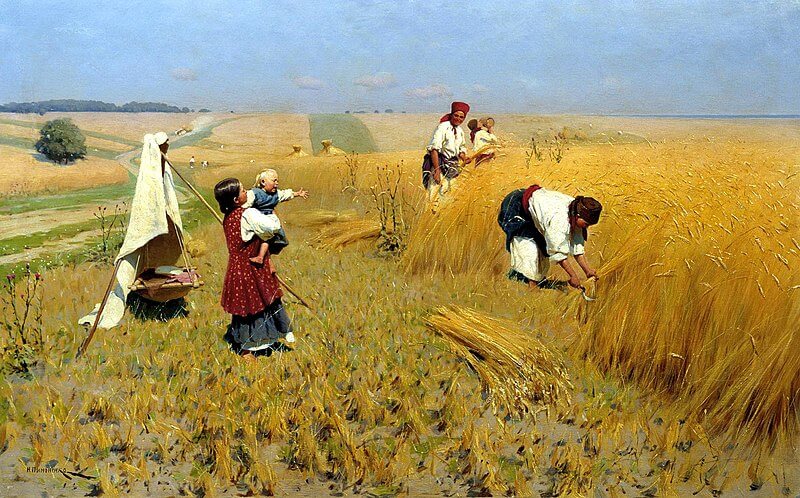
#6
“I empty my mind, I place before it the still recent taste of this first mouthful, and I feel something trembling in me, at a profound depth, something that has been dislodged and wants to rise up, something that might be unanchored; I don’t know what it is, but it climbs up slowly; I feel the resistance, hear the murmur of the distances being traversed.”
#7
“Since nothing has survived of these long-discarded, far away memories, everything has been disintegrated; forms — and that of this little shell-like pastry, so richly sensual under its strict and pious folds — that were abolished or lie dormant have lost the expansive force that allows them to unite with our consciousness.”
#8
“The air there is saturated with the fine flower of a silence so nourishing, so succulent that I can’t advance through these rooms without a sort of greedy enjoyment.”
#9
“The places we have known do not belong only to this spacial realm wherein we, for the sake of utility, situate them. They were but a narrow slice among adjacent impressions that constituted our life at the time; the memory of a certain image is merely our regret for a certain instant; and the houses, the roads, the paths are, alas, fleeting, like the years.”
#10
“Beautiful verses (I who sought in them nothing except the revelation of truth) were all the more beautiful if they meant nothing.”

#11
“These moments where I was next to her and for which I had been impatiently waiting the day before, for which I had trembled in anticipation and would have sacrificed all else, they were, however, in no way happy moments for me; of this I was well aware, for they were the only moments in my life on which I focused a meticulous, tireless attention, which made so that I found in them not an atom of pleasure.”
#12
“I didn’t have to take another step, the ground moved under my feet in this garden where I had long ceased to bring voluntary attention to my actions: Habit came to take me in its arms and carried me right to my bed, like a small child.”
#13
“Then, affording me this joy we feel at seeing a work by our favourite painter that differs from the works of his we’re familiar with, or, better, if someone leads us to a canvass we had up until then seen only as a pencilled sketch or if a piece we had heard on piano alone next appears to us adorned with all the colours of the orchestra, my grandfather, calling to me and indicating the hedge bordering Tansonville, said, “You who are so fond of hawthorns, come and look at this thorn; it’s lovely!””
#14
“And as it landed on the spot where it was always written in me, I was forced to pause for breath, being so much overcome by this name which, at the moment I heard it, seemed fuller than any other, for it was laden with all the times I had, before then, mentally uttered it.”
#15
“And so unfailingly do even the most sincere of people practice hypocrisy and relinquish the opinion they have on a person when talking to him only to express it the minute he has left.”
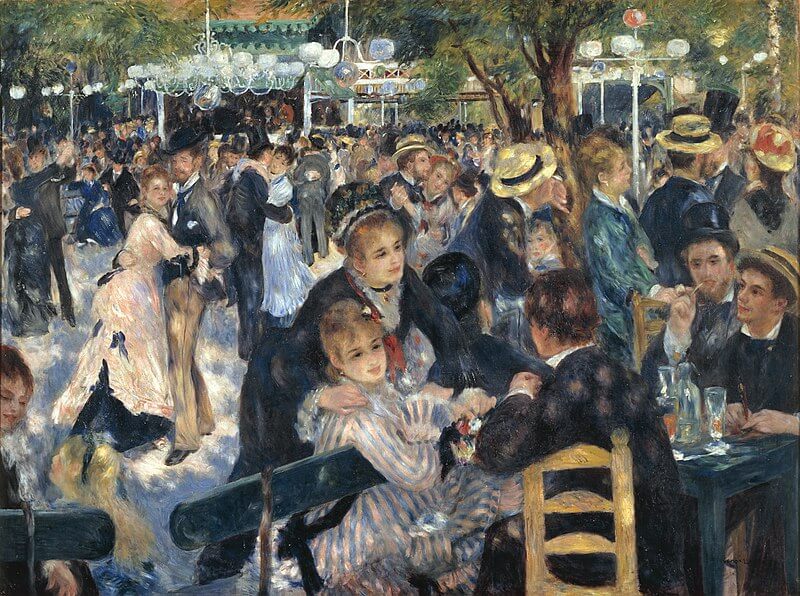
#16
“I felt that it was my duty not to limit myself to these opaque words and to try to examine my delight more closely.”
#17
“Who year after year offer us the changeless spectacle of bizarre habits they believe they’re on the verge of breaking with and retain indefinitely; trapped within the cycle of their malaise and obsessions, their vain struggle to escape it serves only to ensure its functioning and turn the gears of their strange, inevitable, and fatal routine.”
#18
“And straightaway I loved her, for if looking at us with contempt, as, so I believed, Mlle Swann had done, and our thinking she could never belong to us, can at times suffice to make us love a woman, looking at us with kindness, as Mme de Guermantes had done, and our thinking that she, on the contrary, could belong to us, can, at times, suffice too.”
#19
“It’s because I believed in things, in people while I walked them that the things, the beings they acquainted me with are the only ones I still take seriously and that can still give me joy. Be it that this faith that creates is dried up in me, be it that reality takes shape only in our memory, today, the flowers another shows me don’t seem like true flowers.”
#20
“In the same way that an intelligent man doesn’t worry about appearing foolish before his peers, it’s not before a distinguished lord but a simple rustic that a gentleman trembles at seeing his elegance ignored.”

#21
“But at the simple, realist point of view, the land we’re desiring occupies a greater place in our life at any given moment than does the land in which we presently find ourselves.”
#22
“Also, he belonged to this category of intelligent men who have lived idle lives and look for consolation and perhaps an excuse in the idea that this idleness offers their intelligence objects as worthy of interest as anything they might derive from a work of art or a field of study, that Life contained situations that were more interesting, more “romantic” than anything you could find in a novel.”
#23
“We once dreamt of possessing the heart of our beloved; later, the feeling that we already possess a woman’s heart could be all we need so that we fall in love.”
#24
“At this stage in our life we have already been touched by love more than once, it no longer evolves on its own, following its unknown, fatal laws before our passive and astonished hearts. We come to its aid; calling on our memories, yielding to suggestion, we act it out. In recognizing one of its symptoms, we recall, we recreate the others. As we possess its song, engraved on our heart in its entirety, we need only for a woman to provide the opening strands, filled with the admiration we feel at recognizing another’s beauty, and we know what comes next. And if she starts in the middle, at the part where our two hearts come together, where we talk of existing each only for the other, we know this tune well enough that we can at once join our partner in the passage where she awaits us.”
#25
“Also, he had formed the habit of taking refuge in trivial thoughts, something which allowed him to ignore the more fundamental questions;”

#26
“He told himself that to form an exact judgement on someone’s character often all you have to do is take the opposite standpoint to the reputation others have created for them;”
#27
“Not wanting to think about it was to think about it still, to suffer still.”
#28
“She had to say something and she found within her reach precisely the thing she had wanted to conceal and which, being true, had stayed in her mind.”
#29
“Swann had arrived at an age where his philosophy — favoured by those of his time, and also by those within the Princess of Laumes’s coterie, a group Swann had spent much time within and where it was agreed that one’s intelligence was directly related to the extent to which he is skeptical towards everything, and where nothing was considered real and incontestable except a person’s individual tastes — was no longer that of his youth, but instead the practical, almost medical, philosophy of men who, rather than externalizing the objects of their aspirations, try to extract from years past a fixed residue of habits, of passions they might consider as characteristic and permanent, and they deliberately adopt a mode of existence that ensures before anything that these be satisfied.”
#30
“A preliminary suspicion was a necessary condition for him to believe that she was lying. It was, however, also a sufficient condition.”
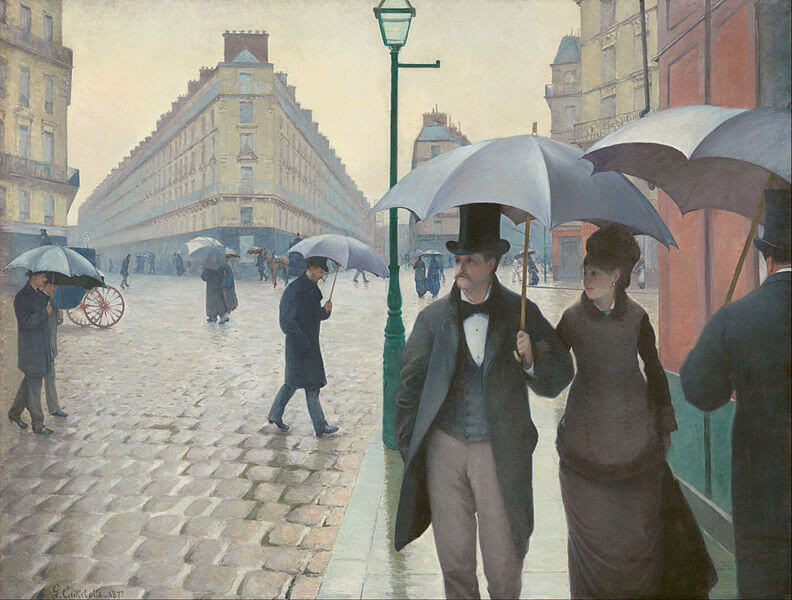
#31
“But the things that, before coming to know them, he would have thought the most disastrous to learn and the most impossible to believe, once he did know them, they were accepted as true and fully and permanently incorporated into his sadness.”
#32
“To know something doesn’t always permit us to prevent it from happening, but at least with the things we know, and hold, if not in our hands, at least in our minds, where they remain at our disposal, we’re given the illusion of having a sort of power over them.”
#33
“We tremble for no one but ourselves, for the ones we love. When our happiness is no longer in their hands, how calm, how aloof, how bold we become next to them!”
#34
“She belonged to this one half of humanity in whom the curiosity the other half has towards beings they don’t know is replaced by interest in those they know best.”
#35
“But in Swann’s depressed state, where he was always in this tremulous condition like that which precedes the moment of one’s bursting into tears, he needed to speak of his sorrow in the same way that a murderer needs to speak of his crime.”
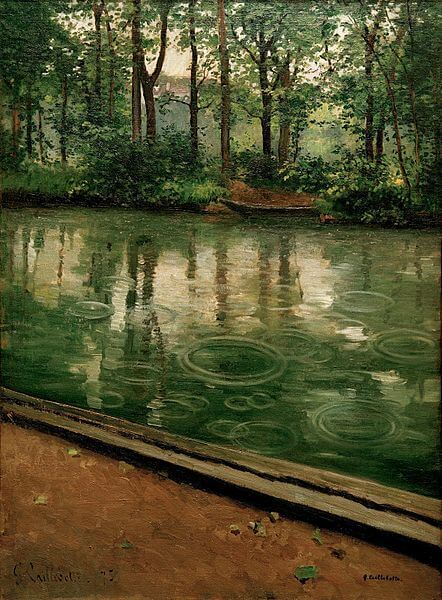
#36
“I find it ridiculous that a man as intelligent as he is can be made to suffer by a woman of that sort, and someone who’s not even interesting, for, from what I hear, she’s fully an idiot,” she added with the wisdom of one not in love, who thinks that a smart man shouldn’t be unhappy unless it’s for someone who’s “worth it;”
#37
“In new surroundings where our sensations aren’t dulled by habit a pain is reinvigorated and sharpened.”
#38
“One never knows his own happiness; one is never as sad as he thinks.”
#39
“For one cannot change, that is to say become another person, all while continuing to obey the sentiments of the person they used to be.”
#40
“Our interests in life are so numerous that it’s not uncommon that in a single circumstance the foundations of a happiness yet to be realized be set alongside the exacerbation of a grief from which we’re suffering.”
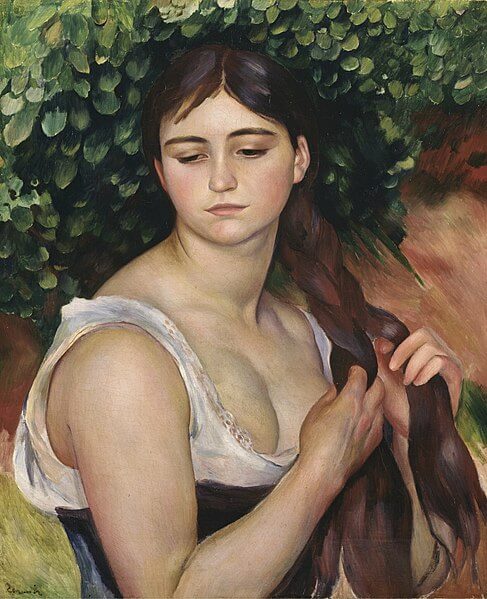
#41
“And, furthermore, even in terms of quantity, the days of our life aren’t equal. To pass through the day, people with a somewhat nervous nature, as is mine, have, like automobiles, different “speeds” at their disposal. There are hilly, difficult days that it takes one an infinite amount of time to climb, and there are days with downward slopes that allow us to descend at full tilt, singing as we go.”
#42
“I like the other plum better; it has a worm in it!”
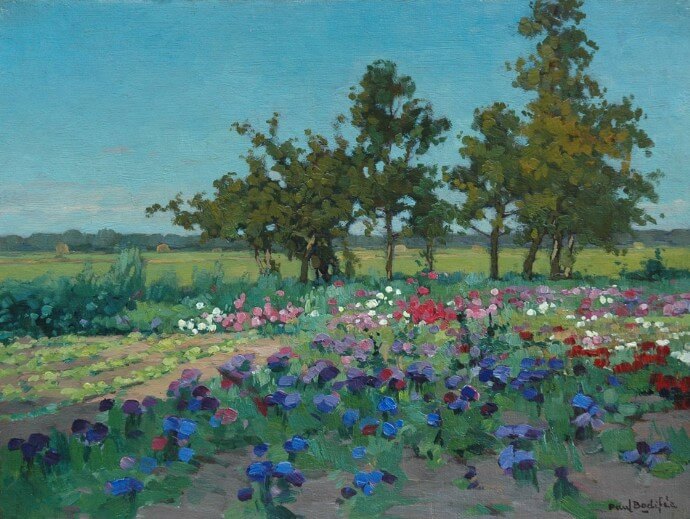
Which one of the above Marcel Proust quotes strike you the most? Tell me in comments.
Feature Image Courtesy: Pierre-Auguste Renoir, Public domain, via Wikimedia Commons
*****
*****
Want similar inspiration and ideas in your inbox? Subscribe to my free weekly newsletter "Looking Inwards"!

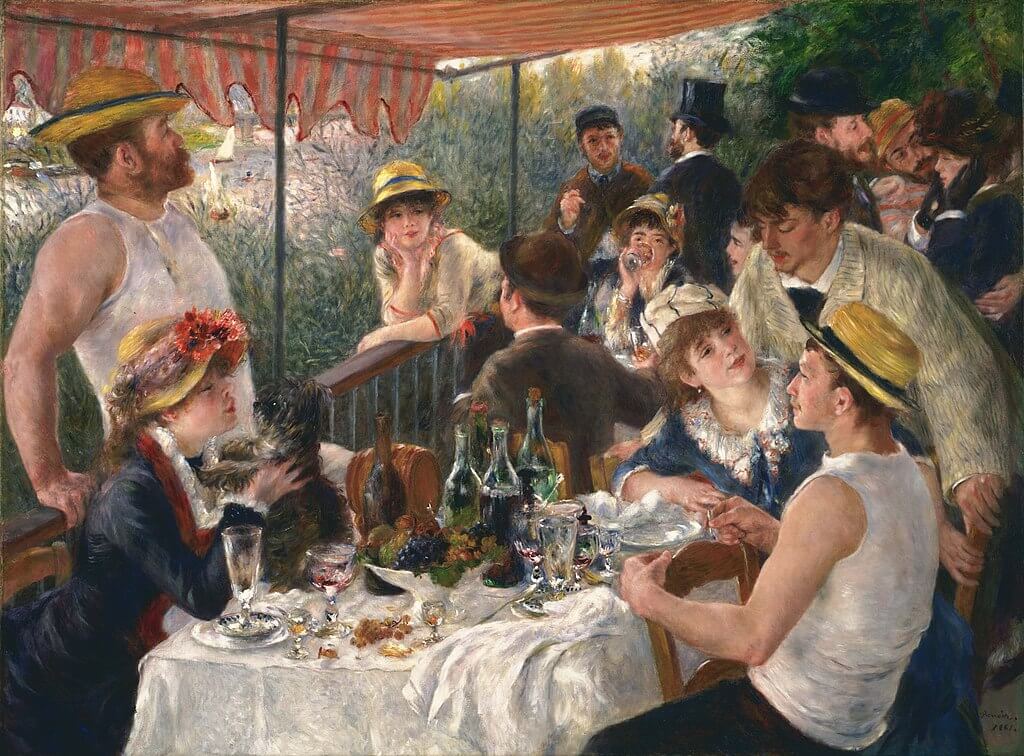
#9 about places! It came at the very end of Vol. 1 but really touched me. I just finished Vol. 1 and will continue the journey into Vol. 2. I find Proust maddeningly boring at times but strangely addictive…..great writing if one persists, read slowly and sometimes back up and reread a couple pages. Thanks so much for your summary of quotes.
That’s some great thoughts to contemplate on. Loved all these Marcel Proust quotes, which has defined life and the inhibitions attached to it from infinite perspectives. Keep going. Great share!